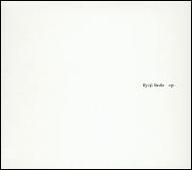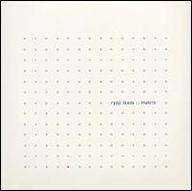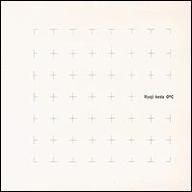Ryoji Ikeda was born in Gifu Prefecture in 1966. He became active as a DJ in the early '90s, and joined the experimental artist collective Dumb Type around 1993. After contributing to Dumb Type's S/N and a few compilations, his first album, 1995's 1000 Fragments, included playful, collage-like recordings which dated back to 1985. 1996's +/- marked Ikeda's first release for Touch, followed by 1998's dynamic 0°C. Time and Space was released by Staalplaat, initially as a double mini-CD in 1998, then as a vinyl EP in 2000. Ikeda's contributions to the Mort Aux Vaches and 20' to 2000 series appeared in 1999. Returning to Touch, he released the double-CD Matrix in 2001, followed by 2002's Op., his first acoustic, string-based recording, which featured performances by Musiques Nouvelles Ensemble and other musicians.
After Olaf Bender and Frank Bretschneider's Rastermusic merged with Carsten Nicolai's Noton to create Raster-Noton, forming one of the premier names in minimalist digital sound art, Ikeda became one of the company's busiest and most acclaimed artists, particularly through his concerts and installation work. He collaborated with Nicolai (aka Alva Noto) as the duo Cyclo., releasing a debut album simply titled . in 2001. Ikeda's Dataplex was released in 2005, preceding the premiere of his long-running Datamatics performances, and subsequently becoming one of his most popular albums. Test Pattern appeared in 2008, as Ikeda began touring a live performance of the same name, and a limited Dataphonics recording was released in 2010. A second Cyclo. album, Id, was released as a CD, a book with a CD-ROM, and an abridged 12" EP in 2011.
Ikeda released Supercodex in 2013 and premiered a performance set of the same name the following year. Live at White Cube, with pioneering turntablist Christian Marclay, was released by the Vinyl Factory in 2015 as part of an exhibition in London. Several other limited releases appeared on the Vinyl Factory, including locked groove records The Solar System and Code Name: A to Z, as well as Music for Percussion (2017), with Geneva-based ensemble Eklekto. In 2018, Noton released Live 2002, an archival performance in collaboration with Mika Vainio and Alva Noto. Ryoji Ikeda EP, containing two lengthy ambient pieces, was released by Finnish label Sähkö Recordings in 2020. Through his own Codex Edition imprint, Ikeda released two volumes of Music for Installations, as well as Superposition, a recording of a 2013 London performance of his piece of the same name. In 2022, he released ultratronics, one of his most elaborate yet approachable recordings. ~ Paul Simpson, Rovi
|
1
|
|
Op. 2 |
|
2
|
|
Data.Adaplex |
|
3
|
|
Contexture |


















